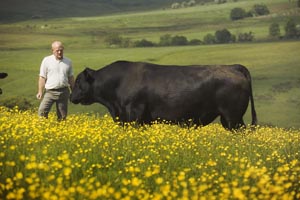
In his self-styled quest for the best, Steve Ramshaw, a successful organic beef farmer/producer in north Northumberland, has imported from Canada selected embryos of rare Wagyu cattle to produce the highly- sought -after Kobe beef, probably the most expensive in the world. Steve, who farms Monkridge Hill Farm, near Otterburn, will be one of the first farmers in the UK to produce the beef, which he hopes to start selling late next year through his meat marketing business, Northumbrian Quality Meats, to top restaurants, speciality food shops and his butcher's shop within the Fenwick food hall in Newcastle upon Tyne.
Steve, who has 120 Aberdeen Angus cattle as well as 700 Scottish Blackface Sheep on his hill farm, has got used to being praised for the fine quality of the organic meat he produces. Chefs like Rick Stein, Brian Turner, Simon King, Gary Rhodes and Terry Laybourne have commended his efforts on television and in cookery books, but he says he is never complacent and is always striving to improve the quality of his produce.
Earlier this year, he and his wife Julia, who supports him in the business, travelled to Canada and the United States on a fact-finding mission, after being told by top Northern chefs that that is where they would find some of the world's finest steaks from Aberdeen Angus and Wagyu cattle. In three weeks they covered 3,500 miles by train, plane and car in their search, talking to restaurateurs, farmers and butchers.
"First of all, we defined what we meat by a great steak, and agreed it must be tender, juicy, flavoursome and eat consistently well," said Steve. They began in a top restaurant in Vancouver where Steve tried prime rib-eye of Angus steak. "It proved to be exceptional on all accounts." In a quality butcher's shop prime Angus steaks were on offer for $59.99 (£29.00) per kilo. The butcher told Steve they were the most popular steaks he sold.
Steve added that in Canada Aberdeen Angus beef is prized for its marbling or intramuscular fat within the meat tissue. The more intramuscular fat the more the meat will retain its juiciness, tenderness and flavour during cooking. "The meat is measured in four standards, A, AA, AAA and prime, which is the highest standard. Tenderness of the meat is so important that the Aberdeen Angus bulls used in the production of this meat are selected and tested for the tenderness of the meat that they will pass on to their offspring."
After a few days' holiday in the Rocky Mountains Steve and Julia travelled south and crossed the border into the USA to visit cattle ranches in Montana, including one which had 3,000 Angus cattle on 22,000 acres. Then it was back to Canada and the great cattle country of Alberta to study how beef is produced. "The criteria for producing great steaks is about selecting the sires. The bulls are ultrasonically scanned across their loin to indicate their level of intramuscular fat in their muscle and genetically tested using a DNA sanple to see if they carry tenderness genes," said Steve. " This system is not used widely in the UK as we farmers are encouraged by meat processors to produce lean meat from fast-growing, large-framed cattle of European origin."
Next, the Ramshaws headed north through the plains of Alberta towards Calgary where Steve visited a friend who produces the rare Wagyu cattle, originally bred in Japan. Kobe beef traditionally comes from this breed, which were used as draught animals because eating meat from four-legged animals was prohibited in Japan for more than a thousand years until the late 1860's.
The Japanese government, in order to protect its domestic beef industry, imposed strict laws to prohibit the export of any living Japanese Wagyu cattle, but in 1976 four Wagyu animals were imported into the United States, with five more following in 1993, and then a further 35 in 1994. Today, there are still very few of the cattle outside of Japan, North America and Australia.
However, Northumberland is set to be a new source of Kobe beef which, according to Steve, is noted for its delicate texture, extreme marbling, exceptional tenderness and deep flavour.
To this end, he has imported the first Wagyu embryos into the North of England as well as embryos from the very best Canadian Angus cattle. And if all goes according to plan, the first Kobe beef to be produced in Northumberland will start being sold by his marketing company late next year.
